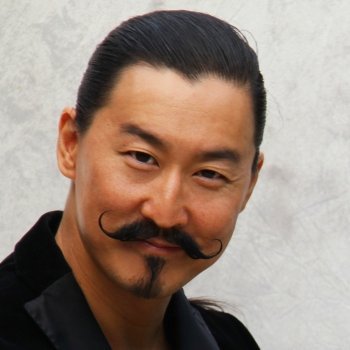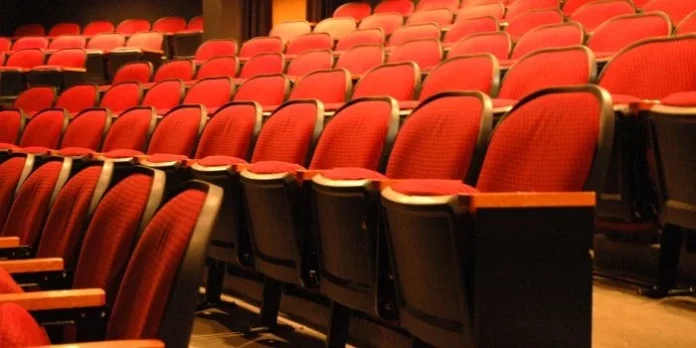Following the success of his two previous solo works Empire of the Son and 1 Hour Photo, The Cultch presents the Vancouver Asian Canadian Theatre production of Kuroko, the latest from Vancouver playwright Tetsuro Shigematsu.
Unlike his previous two plays, however, Shigematsu will not take to stage. Instead, he takes a more traditional role of a playwright with a cast of Asian Canadian actors set to tell his story.
Taking its name from the stagehands in traditional Japanese kabuki, Kuroko is the tale of a dying father’s attempt to get his daughter Maya to leave her bedroom. A hikikomori, or extreme recluse, Maya has spent the last six years shut away exploring virtual reality. Meeting a mysterious player online, she is challenged to the ultimate quest: to save her father’s life by visiting the scariest place IRL, Suicide Forest.
They often say one should let the art speak for itself. In this case, the Governor General’s Literary Award-nominated Shigematsu provides some fascinating insights into Kuroko.
This interview has been edited.
What was the inspiration for telling this tale?
The initial experience that sparked my interest was autobiographical. When I was preparing for laser eye surgery, I knew I’d be out of commission for a couple of days, so I loaded up my iPhone with hours and hours of audiobooks. The experience of lying in complete darkness, with blackout curtains, not knowing if it was day or night, and spending all my conscious hours within imaginative worlds gave me a glimpse of what I suspect the future might feel like.
As we shift from the world of atoms and molecules to ones and zeros, our bodies have already begun to atrophy. Prisoners are guaranteed one hour in the prison yard per day because anything less would constitute cruel and unusual punishment. But how many of us voluntarily spend way less than that outside? Because we’re indoors, hooked up, staring at screens like BF Skinner rats. I’m not a declinist. I don’t think things were better in the past, but it does me irk me when my kids would rather watch YouTube videos than go out for a bike ride with me.
Tell us about the significance of the title and how the kuroko feature in the play.
Kuroko is a metaphor. Literally translated, kuroko means black child, or child of darkness, a rather poetic name for the stagehands in traditional Japanese theatre.
The first time I watched a kabuki performance in Japan, I imagine my date must have found me rather annoying, with me nudging her every few minutes, asking, “what’s up with all the ninja’s on stage?”
Clad entirely in black, audiences in Japan claim not to see them, as they occupy a culturally specific blind spot, in the same way that Western audiences pay no attention to the strings of marionette puppets.
The shadowy kuroko enable players to achieve feats of virtuosity, and the otherwise impossible. So to me, the kuroko is the perfect metaphor for this play. Who is the kuroko? Might there be a person in your life invisibly influencing your decisions?
Does Kuroko come from a personal interest in virtual reality?
I think it’s safe to say that for people below a certain age, say 90, we are all interested in VR. But that interest takes on very different forms. For example, my son has a keen interest in persuading me that US$500 is not a lot to spend on the latest pair of Oculus Rift goggles. His is a very pragmatic interest in VR. As for me, my interest is more philosophical.
Specifically, I’m interested in the promise of VR, which I think might just be the latest guise for that most ancient of impulses, to wake up inside our dreams, to be able to fly, to experience anything we want without paying the price.
Should people be allowed to act out their darkest fantasies? Could the virtual realm act as a pressure release valve enabling us to act out our impulses safely, or will it amplify them like water on a grease fire? Pick your metaphor because no one knows. So much of our behaviour is governed by duress. In a day, we may want to stab this person or lick that person. We don’t do act on these impulses because we know there will be a price to pay. But who do we become when they are no consequences? What happens when incredible sex becomes as easily accessible as having a delicious meal?
What will happen to gender relations when heterosexual men no longer want actual women to satisfy their sexual appetites? What if love and human connection become a utility, like water, electricity and our internet connection? To use Freudian terms, what happens when we become all id and no ego?
These are the kinds of things I think about when my son is explaining to me the minutiae of the Marvel Universe mythology. In other words, I’m not a great father.
Aokigahara (Suicide Forest) features in Kuroko. What attracted you to this somewhat mythical place?
Suicide Forest is notorious for being the most popular place to commit suicide in the world. It burst into a wider public consciousness when YouTuber Logan Paul, made an ass of himself. What is less well known is that Suicide Forest, or as it’s known among the Japanese as Jukai or ‘Sea of Trees’, is that it is associated with the possibly apocryphal custom of ubasute.
According to folklore, during times of famine, an elderly family member would be carried into the wilderness and left there to die. Japanese believe that Suicide Forest is filled with yurei, angry spirits, and is widely considered to be the most haunted place in all of Japan. Mythologically, as a place where many enter but even fewer leave, Suicide Forest can be understood as an entrance to the Underworld, or Yo-mi, the Japanese character for Hades.
For me personally, I’m curious about why this place at the base of Mount Fuji has captured the imagination of a whole generation, why it’s become part of the zeitgeist.
Joyce Carol Oates wrote about boxing as an imaginative space where Americans were able to work their ideas about race and class. For me, Suicide Forest functions as an arena to think about suicide, death, and the real world value we place on human life. It’s facile to make lofty declarations about the infinite value of a single human life, but in practice, that kind of idealism is never manifest, certainly not in our justice system, not in our medical care.
Insurance adjusters for workers compensation can you tell the precise monetary value should you happen to lose the tip of your left pinky. They can tell the worth of your hand, your arm, your whole body, your life, depending on your age, your gender, your education, your earning power. Every one of us assigns value based on race, beauty, size, intelligence, attractiveness.
I’ve been to Suicide Forest. I’ve explored its depths, but to me, I still find myself wandering through its paths and caves. Is suicide ever the right choice? Life is sacred, but what if delaying death increases suffering? Baby boomers – the generation that was never supposed to grow old – now face these very questions. Is it wrong for Japanese to sometimes consider suicide as a way of taking responsibility? Is our indictment of such a calculus a form of ethnocentrism?
Your last two plays also featured you on stage, but this time you’re allowing others to perform. What was it about this particular piece that made you decide not to appear on stage?

I initially had hoped to perform in this play, but the playwriting demands were such, it was decided I could be most useful if I focused myself entirely on the task of writing, and rewriting.
Kuroko is a departure for me. Everything about it is different. I’m known for my solo works, like Empire of the Son. For one thing, it’s a lot less work for me to be “only” a playwright this time around. For my last show 1 Hour Photo, which was about internment, I was rewriting right up until the very last minute before the world premiere. Plus, I had to memorize all that new text.
So I won’t be a part of the cast this time around. That being said, in the tradition of Alfred Hitchcock Presents, I will be introducing the show every night on stage, and then hanging out afterwards to chat.
Was the decision not to perform a difficult one to make?
No, because it was made on my behalf. Which is not to say it was inflicted on me. Part of my modality of working is to collaborate with people who aren’t yes-men. I want push back. I want productive tension. Because ultimately, we all want the same thing, for the work to be all that it can possibly be.
What prevents a work from reaching its full potential isn’t a lack of resources. It isn’t a lack of money. Those factors are easy to blame. It shouldn’t be a lack of imagination. Otherwise, what are we doing in this business?
It often comes down to ego. I want it to be this way because that’s the way I originally intended, and I’m the author of that idea, so don’t mess with my baby. When our ego becomes an obstacle to change, therein lies the downfall.
You’re in the rehearsal room with the actors and director. What’s that process like for a playwright to watch his work come together?
It’s fascinating to watch artistic specialists conjure meaning that was not intended but is clearly encoded in the text. It makes you wonder about the subconscious creative process.
I am of the school of thought that writers write to discover what they think about a particular theme. Under the guidance of a director, talented actors can amplify and illuminate those thoughts and ideas to a level where the playwright will be prompted to exclaim during the show, “that’s genius!” But we’re not talking about ourselves, we’re referring to something more mysterious, a country of creativity that lies between people and not within. Given the autonomy of characters and the alchemy of actor and role, there is a hidden intelligence encoded into scripts. A play can be much more clever than the person who wrote it.
What do you hope audiences walk away talking about after seeing the show?
Have you ever decided to put your phone down for a minute and try having a conversation instead? Of course, you have, but as simple as that sounds, that is a moment of awakening, a moment of clarity within our technologically-induced slumber.
It’s like when you meditate, the moment you notice your mind drifting, that you’re day-dreaming, that very moment is quite profound because you’ve become conscious of your consciousness or lack thereof, even if it’s for the briefest of moments.
I would love it if an audience member had just one moment like that, turning their phone off, and try to be in the moment, the here and now with another human being.
Which reminds me, I should probably go spend time with my kids now.
Kuroko plays The Cultch’s Historic Theatre (1895 Venables St, Vancouver) November 9-17. Visit thecultch.com for tickets and information.

